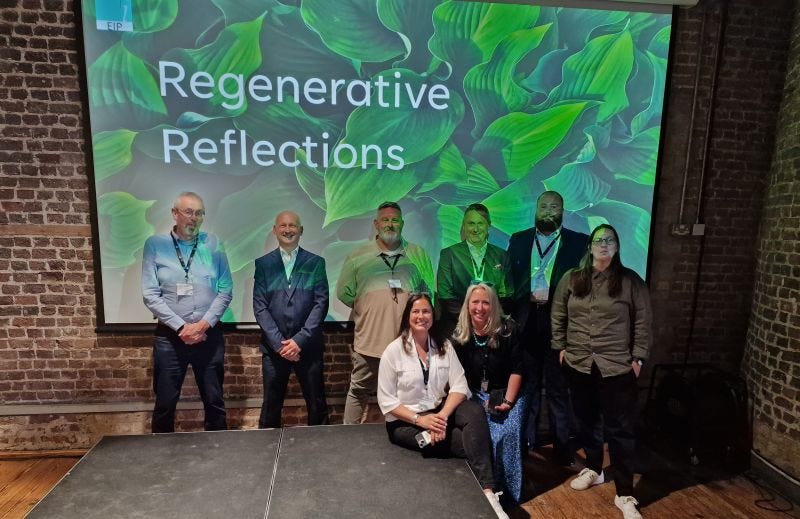Welcome and thank you for reading Regen Notes …
“With the acknowledgement that there isn't a one-size- fits-all definition of what it means to be regenerative, and the common saying of 'doing more good' or 'giving back more than we take' only scratches the surface, if there was a conclusion from this programme, it is about who we are, and how we act in the world where we love, live, work and play”
Well, we finally launched the Echelon regenerative sustainability report, From Surviving to Thriving on the 6th of June at the AMIP event in the Museum of London Docklands.

"Regenerative thinking can help and guide us to determine where we can make the most significant positive impact in providing social housing" From Report Headlines
Connecting
The report covers areas explored during the 8-month-long series of workshops and nature days, including Regenerative Reflections & Principles, The Regenerative Mindse, Regenerative Project Management, Regenerative Community, Regenerative Organisation and the important Advocacy & Agency. At the end of each section, we prompt the reader to consider how we can better connect with ourselves, our organisations, the sector and importantly how we connect with the natural world.
Shifting our language
Core to the section of Agency and Advocacy we question the sustainability language we use …
The language and words we use play a critical role in advancing towards a sustainable, regenerative future. It is time that we move on from an overused and confusing “business as usual” sustainability language that can mask inaction and start adopting a language that inspires and encourages positive action.
For inspiration and reflection, we list several powerful “regenerative” expressions that can replace conventional and tired sustainability words.
Regenerative Project Management
Regenerative Project Management advocates for enabling projects to become part of the climate and biodiversity solution, not continuing to be a part of the problem, through adopting the Living Building Challenge, Declare and Biophilia and reviewing the health impacts of materials we use in our buildings.
Giving Time + Space
Running throughout the working group sessions and core to the report is the theme of interconnectedness with the natural world and with ourselves, through getting outside, giving nature a voice in board rooms and project teams, finding and giving the time and space to ask better questions, and to carve out that vital time for our reflection and recharging.
I have reproduced below the launch news item posted on Linkedin by Echelon
Are we healing the future or stealing from it?
What does regenerative social housing look and feel like?
These are some of the questions that are explored in our new Regenerative Sustainability report From Surviving to Thriving, which was written in conjunction with consultants Martin Brown, FRSA and Anna Williamson MSc, FRSA, LFA, based on materials gathered through Echelon Improvement Partnerships’ Regenerative Sustainability Programme.
Martin Brown was a guest speaker at the Echelon Group’s annual conference in 2021 and his presentation highlighting the importance of adopting regenerative sustainability principles in every aspect of our lives was a game-changer.
Positive feedback from delegates convinced Echelon to bring together a group of like-minded clients, contractors, and suppliers, to define what regenerative sustainability means within the context of social housing, and to us as individuals.
The programme ran for eight months, with 10 interactive workshop modules including two in-nature days, and was devised and led by Martin and Anna, with Luke Driscoll, Director of Asset Management & Sustainability at the Hyde Group, chairing the working group.
Based upon regenerative ‘principles’ from the Regenerative Playbook, it covered what these principles can mean to our regenerative self, a regenerative organisation and a regenerative social housing sector, interactively exploring topics such as carbon, resources, materials, project management, well-being and supply chain management, through a regenerative lens.
We officially launched the report at yesterday’s AMIP meeting, with a presentation from Anna and Martin and some amazing insights from some of the programme’s participants, who talked about what they had learnt and how they had put that into practice in both their work and personal lives.
Ben Williams from Wates said that from a contractor’s perspective there was the potential to think differently about the procurement process and the materials used, moving towards a focus on value. “We all want to do the right thing but how do we do that in a competitive environment landscape?” he asked.
Joseph Hayes from Axis said that the course, was a “breath of fresh air” had enabled him to get a different perspective and to connect with others. He outlined how the company has started to conduct some meetings on foot, giving people the opportunity to get out of the office.
Peter Sharman of Mulalley described the programme as a “thought-provoking” journey. Since participating Mulalley has implemented lunchtime walks and an environmental newsletter.
Use the button below to download the report from the EIP website
Please do read, use, like, share and give feedback …




